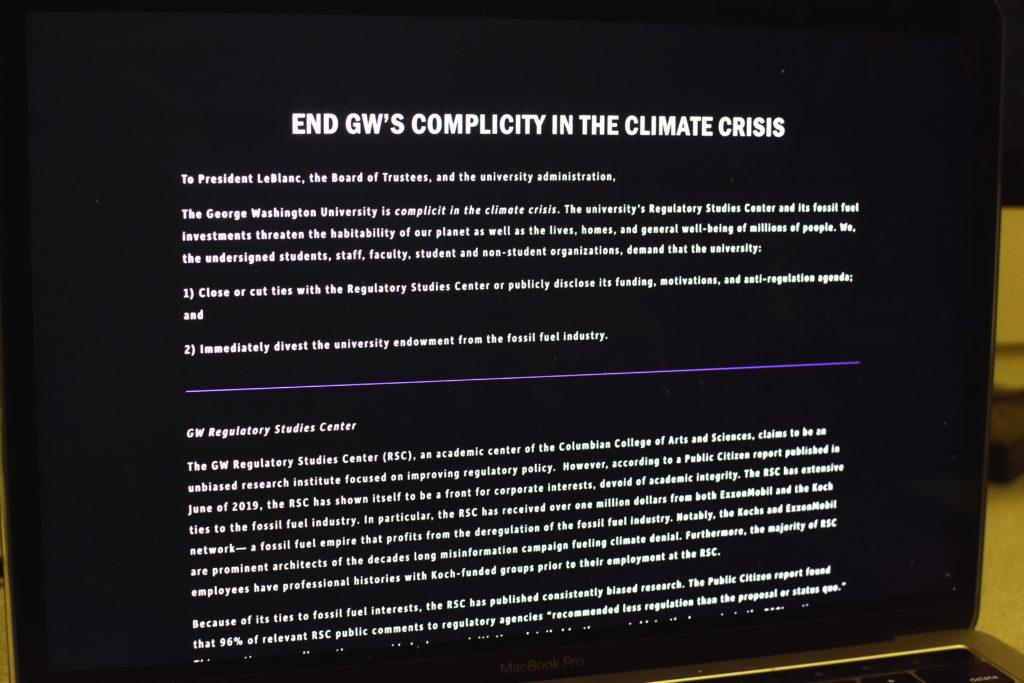Students are calling on officials to cut ties with the fossil fuel industry and reconsider its relationship with a research center that receives donations from fossil fuel companies.
Members of Sunrise GW – a student-led environmental activism group formerly known as Fossil Free GW – published a letter late last month urging officials to divest from fossil fuels and restructure its relationship with the Regulatory Studies Center, a research hub that receives donations from fossil fuel companies like ExxonMobil. Students who endorsed the letter said the University should distance itself from the center and divest GW’s endowment from the fossil fuel industry to meet national environmental standards.
Sunrise GW member and sophomore Bryce Maples said the group posted the letter to build wide-scale student support for fossil fuel divestment, which he said will ultimately encourage officials to adopt the letter’s requests. Maples declined to say when the group will present the letter to University President Thomas LeBlanc and the Board of Trustees.
“We are done with our University pretending to care about the climate by using their support of the Paris Climate Agreement and talking about sustainability but then investing more than $20 million in fossil fuels and the climate crisis directly,” Maples said. “We feel that we’re in a time where we need to stand up and fight back or we don’t have a future to fight for.”
Maples added that the letter garnered more than 100 signatures within three days of the launch, and six student organizations including the Progressive Student Union and Green GW, have all endorsed the letter. He declined to specify the total number of signatures on the letter.
The letter urges officials to “close or cut ties” with the Regulatory Studies Center or “publicly disclose its funding, motivations and anti-regulation agenda.” The letter calls on officials to divest its endowment from the fossil fuel industry.
Sunrise members extracted the data from a June 2019 report from Public Citizen – a progressive consumer rights advocacy group – that has criticized the center for alleged right-wing bias.
Officials have previously stated that divestment is not part of the University’s investment strategy. A 2015 report financed by the Independent Petroleum Association of America – an oil and natural gas trade organization – predicted that universities’ endowments would likely shrink if officials withdraw their holdings in fossil fuels.
The ExxonMobil Foundation donated $927,000 to the center between 2013 and 2017 and the Charles Koch Foundation – a foundation that funds research grants – gave about $1.2 million in grants to the University between 2010 and 2017, according to the report. Foundation and University spokespeople did not return Public Citizen’s requests to confirm whether the gifts were given primarily to the center or other departments, the report states.
Maples said Sunrise reached out to several student organizations for input on the wording of the letter. He said the group will spend the semester growing interest in the letter among other student organizations in which Sunrise members are also involved.
“The most important element is movement building and coalition building,” he said. “We want to involve as many students, faculty members and student organizations as possible.”
A University spokesperson said Sunrise GW had not yet contacted officials about the letter, but officials will be “happy to respond” once they do.
The Student Association Senate unanimously voted in 2016 in favor of divesting the University’s holdings in the fossil fuel industry, and 70 percent of students indicated support for divestment in a 2015 referendum.
Jillian Webber, the president of Food Recovery Network, which has endorsed the letter, said she met individually with Sunrise members in December to help craft the language of the letter. She said she decided to endorse the letter because green organizations on campus should support important sustainability issues, even those that aren’t related to their group’s specific focus.
She added that she shared the letter on Green GW’s social media and will include the letter in GW Food Recovery Network’s weekly newsletter so group members can learn more about Sunrise’s efforts and continue to grow support for divestment.
“Although we occupy different niches within the sustainability community, I think, most importantly, it’s really important that all the green groups get together and endorse the letter because we’re holding the University accountable for not doing its part in the climate fight,” she said.
Keith Nagy, the president of GW College Democrats, said the group’s executive board decided to sign the letter to strengthen the organization’s relationship with Sunrise. He said part of the executive board’s mission is to build connections with other student groups.
Nagy said the group has shared its endorsement on social media and encouraged College Democrats members to sign the letter. He said he will potentially organize rallies with organizations like Sunrise this semester to demonstrate the student organization’s commitment to supporting divestment.
“We feel that this is very much in line with progressive ideals that are valuable to the Democratic Party with environmental stewardship,” he said. “We thought that this would be a great way to better our relationship with Sunrise GW while also advocating for a pretty great cause.”
Ed Prestera, Isha Trivedi and Jarrod Wardwell contributed reporting.





